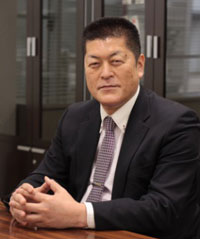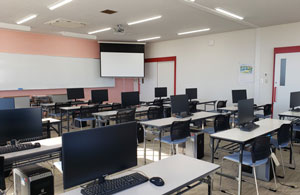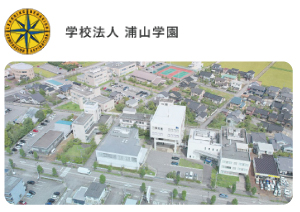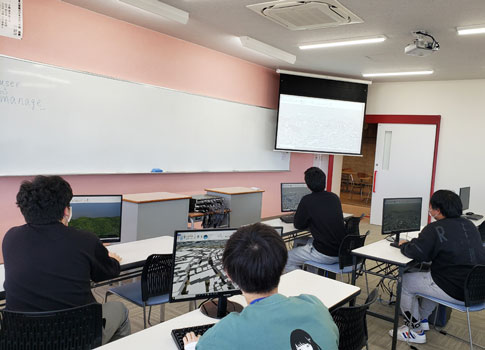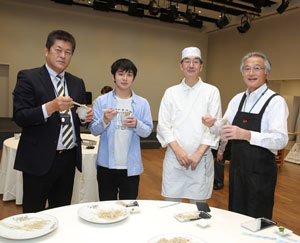|
|||||||||
|
|||||||||
55 Years Since Founding School, Bit Continues to Expand in the New Fiscal Year In 1965, it was approved to operate the predecessor of Urayama Gakuen, vocational school of Chuo Yobiko (Central Preparatory School), which opened in the next year, in April 1966. In December of the same year, it was approved as Associate school corporation Urayama Gakuen. In 1968, Urayama Gakuen's first vocational school opened (Chuo Keizai Technical School, later renamed as Toyama Keizai Technical School and further, Toyama Technical School of Information Business). In 1996, Urayama Gakuen was approved as a school corporation from an associate school corporation, and in the following year 1997, Toyama College of Welfare Science opened. In the 55 years since the founding of Urayama Gakuen (Gakuen), each school under Gakuen has expanded, reorganized, and renamed departments and majors in response to the needs of the times and the region. Today, Gakuen consists of three schools: Bit, Toyama College of Welfare Science (both in Imizu City, Toyama Prefecture) and Kanazawa Chuo Preparatory School (Kanazawa City, Ishikawa Prefecture). Among them, Bit consists of the following 8 departments and 14 majors (including 2 Departments (Architecture and Design, and of Civil Service) and 4 majors of them will be established in April 2022) and 1 graduate school (Graduate School of Medical Information Management): 1) Department of Information Systems (Programming Major, Robot / IoT Major, Cloud Major and Game Creator Major), 2) Department of Web Creators (Web Creator Major), 3) Department of Hotel and Wedding (Hotel and wedding Major), 4) Department of Architecture and Design (Licensed Architect Major, Architecture CAD Major and Surveyor Major), 5) Department of Medical Administration (Medical Administration Major and Pharmaceutical Registered Seller Major), 6) Civil Service Department (Civil Service Major), 7) International Business Department (International Business Major), and 8) Japanese Language Department (Japanese Language Major). Toyama College of Welfare Science consists of four departments: 1) Department of Social Welfare, 2) Department of Nursing, 3) Department of Early Childhood Education, and 4) Department of International Tourism.
Focusing on Human Resource Development That Meets the Needs of Local Community and the Times Bit is based on the founding spirit of the school: "Formation of Simple and cheerful personality" and " Formation of personality that contributes to society through specialized academics and its application". Further, Bit collaborates with the local community to embody the concept of "Community and academy integrated as one", aiming to be an educational and research institute as a base for solving regional problems. Bit promotes exchanges with local governments and local business circles, and at the same time, in order to lead to human resource development required in the region, a system has been built up that reflects the needs of the local community in the curriculum organization of specialized courses and reorganization of departments and majors. As part of this, as mentioned above, the Department of Architecture and Design, consisting of three majors, will be established in April 2022. This is due to the remarkable decline in the 18-year-old population in Toyama Prefecture, which is greater than the nationwide, as well as the awareness of the actual situation that has led to outflow of high school graduates out of the prefecture due to restrictions on more advanced educational opportunities in the architectural field, and the needs of human resources in the prefecture in the field. There was also a desire to create an environment for high school students, where they can learn in the prefecture and increase the options for learning, according to Principal Noto. Bit also emphasizes human resource development that adapts to the needs of the times. Apart from the specialized knowledge of each major, the educational goal is to develop professionals who have “comprehensive human skills” rich in sociality, creativity, and internationality. As its original specific plans, Bit has made general subjects common to all departments available: 1) "NIB (Newspaper Utilization Course)" to correctly read and express information with the cooperation of local newspapers, 2) "Data marketing" to learn how to analyze data using big data, and 3) "Expressive power" to learn expressiveness and communication skills through theater, etc. In addition, as the fourth mainstay, "ICT utilization" is newly positioned to learn presentation techniques using VR based on UC-win/Road. On the other hand, from fiscal 2020, the entire Gakuen has developed the "Smart Campus Concept". Its aim is to make full use of groupware to improve the efficiency of schoolwork through paperless and cashless work, to facilitate communication with students, as well as to produce students who are well adapted and acquainted with such advanced technologies.
Some classes Started with UC-win/Road Introduced, in All Departments from the New Fiscal Year
In the class, they first explain the basics of how to use UC-win/Road through the process of generating 3D space from map and terrain data and creating road structures such as roads, intersections, traffic lights, etc. Then the students create a school route about an 8-minute walk from the nearest station, “Kosugi Station of Ainokaze Toyama Railway” to the campus with 3DVR. The students also learn how to create and edit parts such as chairs and desks that are likely to be used in hotels with CG according to their major field using another game engine or Shade3D, an integrated 3DCG software of FORUM8.
Moreover, concerning the advantages of using VR, Principal Noto listed examples of "what cannot be expressed in real life but can only be expressed by VR", for instance, the world and urban development that they envision, exploration inside the computer, etc. He expects that the pleasure of creating something that has been unseen before in a VR space will lead to the creation of environment to enjoying learning. However, in order to do so, it is essential to foster teachers in charge of this class early in addition to Prof. Yamamoto. Therefore, amid many restrictions due to coronavirus crisis, they are actively working, mobilizing more than 30 school faculty members for the operations briefing of UC-win/Road and Shadow3D conducted by FORUM8. Future VR Development
|
| (Written by Takashi Ikeno) (Up&Coming '22 New Year issue) |
|
|||||

